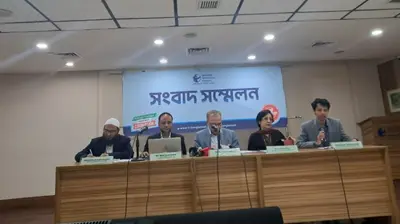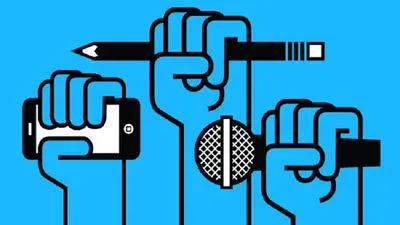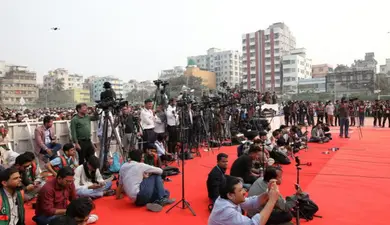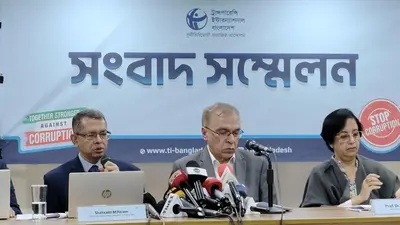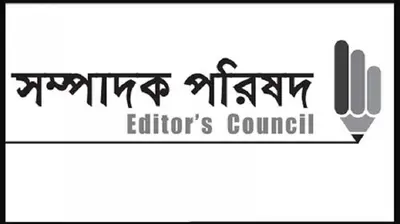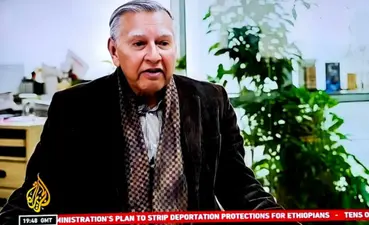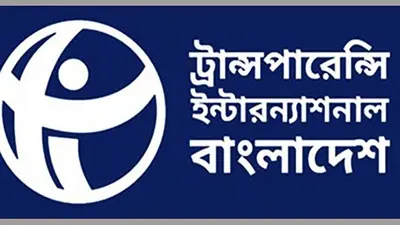Silenced by Fear
Journalists in Bangladesh Under Siege

On August 22, 2025, the body of senior journalist Bibhu Ranjan Sarkar, 71, was found floating in the Meghna River in Munshiganj District. A widely respected columnist and the Senior Assistant Editor of Ajker Patrika, Sarkar had been a vocal advocate for secular democracy and press freedom. Just a day before his death, he emailed an open letter to bdnews24 with a chilling note: “You may publish this as my final writing.”
In that final piece, Sarkar expressed deep frustration with the state of the media under the current regime. “Despite standing for the Liberation War and secular democratic politics, I am still labelled with the ‘Awami tag’… In the past year, after the government changed, media conditions worsened,” he wrote. He described an atmosphere of fear and intimidation, where media executives anticipate phone calls ordering stories to be removed. “Speaking truth means risking life,” Sarkar warned, adding that he had been haunted by a sense of something ominous for days.
His death is not an isolated incident but part of a wider, alarming pattern of violence and intimidation targeting journalists in Bangladesh. On August 9, 2025, Helal Hossain Kabir, Executive Editor of the weekly Alormoni, and his mother were assaulted at their home in Lalmonirhat District. On August 7, Asaduzzaman Tuhin, a reporter for Pratidiner Kagoj, was fatally stabbed in a crowded Gazipur market. Just a day earlier, on August 6, Bangladesher Alo reporter Anwar Hossain Sourav was attacked by extortionists in front of police in Gazipur’s Sahapara area.
Earlier incidents also reveal a clear trend of rising hostility. On June 25, Shah Alam Khandaker of Matri Jagat was killed by a kidnapper in Brahmanbaria’s Nabinagar Upazila. On May 15, Soami TV journalist Bahar Raihan was attacked and stabbed while covering a student protest by the BNP’s student wing, Chhatra Dal, in Comilla.
Since the forced ouster of Prime Minister Sheikh Hasina on August 5, 2024, Bangladesh has descended into a profound law and order crisis. The interim caretaker government, led by Nobel laureate Muhammad Yunus, came into power promising reform. Instead, it has presided over a wave of violence and repression. According to data compiled by the Institute for Conflict Management, at least nine major incidents targeting journalists occurred between August 2024 and August 2025, resulting in three deaths and injuries to six others. Observers warn these are gross underestimates.
A July 2025 report by the Human Rights Support Society (HRSS) documented 152 attacks on journalists in the first six months of the year alone. A total of 257 journalists were harassed, 111 were injured, 20 assaulted, and 34 directly threatened. Reporters Without Borders (RSF) confirmed a surge in attacks since February 2025, involving beatings with batons and hammers. “While the interim government’s takeover raised hopes for improvement, journalists’ safety remains unprotected,” said RSF South Asia head Célia Mercier.
Beyond violence, the regime has aggressively pursued criminal charges against media workers. As of May 2025, at least 266 journalists were implicated in cases related to the 2024 political violence. Dhaka saw the highest number (88), followed by Sylhet (39) and Chittagong (36). Other districts, including Brahmanbaria, Bogura, Kushtia, and Narayanganj, also saw multiple prosecutions. Journalists even faced murder charges in districts like Cox’s Bazar, Barguna, Jashore, and Munshiganj. Around 50 media houses have been impacted.
Adding to the pressure, radical Islamist groups have grown emboldened under the new regime. On August 1, 2025, Dabanol journalist Anwar Hossain reported receiving death threats from Jamaat-e-Islami (JeI) supporters. On May 2, Hefazat-e-Islam leaders demanded stricter control of media content they deemed “anti-Islamic.” In February, a student group publicly threatened outlets broadcasting statements from the ousted former Prime Minister Sheikh Hasina, calling her “the Butcher of this Motherland.”
The situation escalated further in October 2024, when the Bangladesh Financial Intelligence Unit (BFIU) launched financial investigations against 85 senior journalists. The probe targeted individuals from leading outlets including Bangladesh Pratidin, Kaler Kantha, Samakal, Daily Sun, Ekushey Sangbad, and Ekattor TV, among others—suggesting a systemic crackdown rather than isolated actions.
The general law and order situation has also continued to deteriorate. Police arrested 593 individuals during nationwide raids between August 3–4, 2025. Weapons and explosives were seized, but the arrests have done little to improve public confidence. In a separate eight-day operation ending June 5, 2025, the Army and law enforcement arrested 384 people, including suspected criminals, gang members, and drug traffickers.
However, critics argue that the caretaker regime’s actions have often favored extremists rather than reining them in. Since taking power, the government has released over 300 individuals accused of militancy-related activities. Among the most controversial was the release of Shafiur Rahman Farabi—linked to the murder of secular blogger Avijit Roy—and ABT leader Mufti Jashimuddin Rahmani. Other high-profile Islamist figures acquitted or released include ICS leader Nasir Uddin, JeI-ICS members in Rangpur, and Mamunul Haque of Khelafat Majlish.
More alarming is the integration of these extremist elements into the state apparatus. In December 2024, former Hizb-ut-Tahrir member Nasimul Gani was appointed as Home Secretary. In November 2024, Mahfuz Alam, also with past HuT links, was named Advisor to the Ministry of Information. Former Hefazat VP A.F.M. Khalid Hossain now serves as Adviser for Religious Affairs. These appointments have intensified concerns over the government's alignment with hardline ideologies.
Amid political instability, criminal impunity, and creeping religious radicalism, journalists in Bangladesh find themselves under siege. From violent street attacks to bureaucratic harassment and state-sponsored financial probes, the tools of repression are wide-ranging and deliberate. Yet, despite these threats, many continue to report, investigate, and write—determined to preserve the last vestiges of free expression.
Bibhu Ranjan Sarkar’s haunting words—“Speaking truth means risking life”—now serve as a grim reflection of journalism’s cost in today’s Bangladesh.

